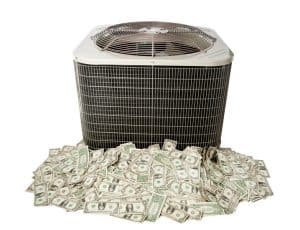
You are going to run into problems with your air conditioning system at some point. “Problems,” of course, is a very broad term. An air filter that is too dirty is a problem, but it is one that homeowners can pretty easily resolve on their own. A refrigerant leak, on the other hand, is a very serious problem. If you have any reason at all to suspect that you have a refrigerant leak, then you absolutely need to schedule professional repairs right away.
If you want the best air conditioning in Loveland, CO, then you need an air conditioner with the ideal amount of refrigerant in the system. It’s just that simple. Low refrigerant levels cause serious issues, potentially doing irreparable harm to systems. And refrigerant is not just something that you can top off, like the gas in your car, when it runs low—because it should never run low. More on that below. Let us handle your AC service needs.
What Does Refrigerant Do?
It is not an exaggeration to say that the whole operation of your air conditioning system hinges upon the refrigerant cycle. Without refrigerant, your air conditioner simply cannot cool your house! Your air conditioner does not generate cooled air out of, well, thin air. No, it removes heat from the air that is already in your home, and then redistributes that air back throughout the house. And it does so through the evaporation and condensation of refrigerant.
As the refrigerant evaporates in the indoor evaporator coil, heat is drawn out of the air. That warmed refrigerant then travels outside, where it is condensed, releasing its heat into the air outdoors. This cycle continues until your desired temperatures are met throughout your home. It’s a relatively simple process in theory, but a refrigerant leak can bring everything grinding to a halt.
Your AC Does Not Consume Refrigerant
That refrigerant cycle that we discussed above does not involve the consumption of refrigerant. Instead, the cycle continues over and over again in a closed system. That means that a decreasing level of refrigerant indicates a leak. Why is that such a major problem?
- Low refrigerant levels lead to higher energy costs, as the system must run longer and longer.
- Eventually, the system can start to short-cycle as it overheats, running in short bursts. This further raises operating costs.
- Additionally, the system is put under a lot of excessive strain. This increases the risk of operational problems.
- You’re now paying more money for less cooling, while also covering repair costs that could have been avoided.
- Eventually, the compressor can seize up. At that point, you’ll probably be looking at a whole system replacement.
If you notice that your AC keeps developing ice, that it is short cycling, or that its cooling output is decreased, then you need to contact us right away. Don’t allow a refrigerant leak to take a serious toll on your home cooling system.
Schedule your AC repairs with Fort Collins Heating & Air Conditioning. Big enough to serve, small enough to care.



